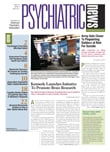The APA annual meeting will mark the completion of my two-year term on the APA Board of Trustees. It has been a remarkable experience in many ways, and it has been a privilege to serve as your representative.
I have been impressed by many aspects of the organization, chief among them the dedication and commitment of the members who serve on the Board, in the Assembly, and on the councils and other APA components. With all of our lives as busy as they are, to find those few extra hours to draft a resolution, meet with a member of Congress, or respond to a media request is no small task, and these volunteers deserve our appreciation.
I have also been impressed by the dedication and skills of the APA staff and the array of programs and issues they deftly manage for the Association's membership. Not infrequently, an impassioned argument would be made during a Board of Trustees meeting for this program or that initiative, only to have it come to light that the staff already had it covered.
While the Association has many strengths, there was one aspect of the experience that was disheartening and even perplexing, especially given our profession—how we manage conflict.
While I appreciate that we live in a world with finite resources and competing interests, too often it seemed that pushing for a particular position was more important than preserving the sense of our belonging to a community. Examples that come to mind are the invitation of Desmond Tutu to speak at the annual meeting Convocation, concerns about ABPN certification requirements, and the development of DSM-5. With all of these issues, there are very good reasons that colleagues may hold opposing views. But conflict is all in how you manage it, and we too often manage it in a way that discourages communication and erodes our group identity. We can do better than that, and the field, our patients, and our communities would be better served if we did.
Where better to reaffirm our sense of community than in Hawaii, where this year's annual meeting will soon begin and where Lauren Hodges, M.D., a local MIT, describes things getting done the "aloha way." Aloha meaning peace, kindness, and compassion. May our time in Hawaii renew our commitment to cooperation, communication, and community. Aloha.
Footnotes
Kayla Pope, M.D., J.D., is APA's member-in-training trustee, the Robert L. Stubblefield AACAP resident member to the AMA, and a clinical research fellow at NIMH and Children's National Medical Center.

